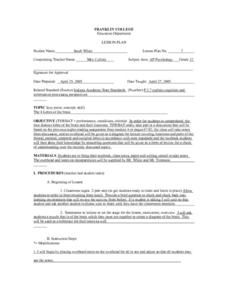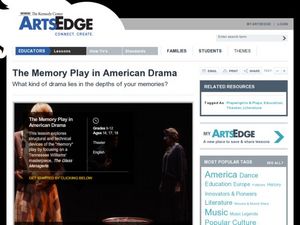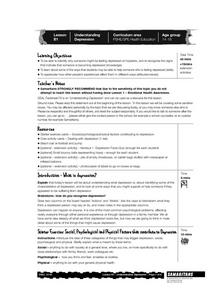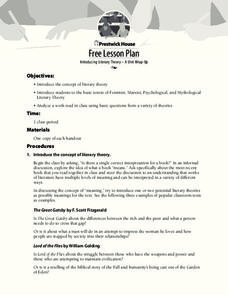Curated OER
The Four Lobes of the Brain
Twelfth graders are introduced to the four lobes of the brain and their functions. As a class, they participate in a discussion about an article they read earlier. They answer comprehension questions as a way to review the material.
Curated OER
Killing Fields
Pupils view a television program that explores people's perceptions and expectations in war prior to and after WWI. They discuss the effects of trench warfare and write a journal entry or short oral report reflecting on their...
Curated OER
The Memory Play in American Drama
Students take a closer look at a memory play. In this American drama lesson, students read Tennessee Williams's The Glass Menagerie and analyze it as a memory play. Students discuss the linear and non-linear aspects of the play prior to...
Curated OER
Children's Literature Meets Learning Theories
Students examine learning theories and principles through children's literature. In groups, they select theories and create multimedia presentations exemplifying them. Students discuss the various themes related to human growth,...
Curated OER
Guillermo Kuitca Art
Students analyze the art work of Guillermo Kuitca. In this art analysis lesson, students analyze the geographical art of Kuitca and complete discussion activities. Students read about the artist and complete a related activity.
Curated OER
Islamic Roots of Judaeo-Christian Culture
High schoolers discuss the stereotypes associated with the major religions of the world. Using primary sources, they summarize the information and role play various roles to the class. They participate in a debate between the different...
Curated OER
Understanding Depression
Learners examine depression. In this personal health lesson, students identify characteristics of depression and discuss ways that they can support those who feel helpless.
Curated OER
Samuel's Choice
The book, Samuel's Choice is used to illustrate the decisions that African Americans who were enslaved during the Revolutionary War had to make. The series of four lessons is designed to be implemented after the book is read. The book,...
Curated OER
Class Reunion
Students explore the process of decision making regarding their own goals and objectives. They consider their future and preparation for life beyond high school by completing a Class Reunion sheet.
Curated OER
THE OCCUPATION OF KOREA BY JAPANESE IMPERIALIST FORCES
Students read and respond to a history of Korea. For this occupation lesson, students work in groups to research the effects of Japanese occupation and create an illustrated timeline. Students listen to a lecture and write an acrostic....
Curated OER
Do You Have a Blog?
Ask learners about their personal writing habits, such as whether they keep a journal or a blog, or if they'd ever want to. Though this is not a fully developed lesson, you can use this article and question to provoke discussion and...
Curated OER
Anthropology and Sociology
Learners examine the combined subjects of anthropology and sociology and explain how the disciplines would study the same issue. On poster board, they locate or draw pictures related to the two subjects. Once this is completed, students...
Curated OER
Teen Pregnancy
Young scholars consider the implications of teen pregnancy. In this personal health lesson plan, students discuss how mothers prepare for pregnancy physically and financially. Young scholars compare their daily routines to those of young...
Curated OER
Consumerism and the Consumer Society
Young scholars read an article titled "How Much Is Enough?" by Alan Durning. They work in small groups to summarize the author's main point for each paragraph and then identify and discuss further questions they may have in response to...
Curated OER
Samuel's Choice - Social Studies Using Children's Literature
Fifth graders read a book about independence, freedom, and slavery. Students create a story map of the book. They research the causes of the Civil War. Students write a newspaper article from the point of view of an American colonist.
Prestwick House
Introducing Literary Theory – A Unit Wrap-Up
Literary theories are lenses through which a text may be analyzed. The question in this lesson plan is how a particular literary lens can influence the reader's view of the text.
Curated OER
The Story of Magic: Centuries of Deception
Learners examine the history of magic and the men and women who practice the art. The Story of Magic would be useful for classes on Religion, Culture, Mythology, Physics and Psychology. It is appropriate for middle school and high school.
Curated OER
Moral Development and Gender
Students participate in a class discussion about moral development based on Kohlberg's and Gilligan's moral orientations.
Curated OER
Anger (Part 1): Identifying Our Style
Students identify the two common sources of anger. For this psychology lesson, students discuss productive ways to express anger. They complete a reflection worksheet at the end of the lesson.
Curated OER
Conflict and Communication
Pupils brainstorm the common causes of conflict. For this psychology lesson, students discuss effective ways to respond to conflict situations. They evaluate how they communicate their wants and needs to others.
Curated OER
The Civil War Soldier's Experience
Students examine the social experiences of the soldiers on the battlefield. Using various viewpoints, they compare their daily life experiences and motives for fighting for the Confederate, Union and African-American soldiers. They...
Curated OER
Principles of Classical Conditioning
Twelfth graders examine the concept of classical conditioning. They listen to a lecture about the principles of classical conditioning and the basic response and stimulus experiment conducted by Pavlov. Students discuss and identify...
Curated OER
SLAVE TRADITIONS AND RELIGIONS: AN INSTITUTION CREATED WITHIN THE SLAVE COMMUNITY
High schoolers learn and discuss the origins of slave traditions and religions. They use a T-chart and compare the slaves lifestyle with other modern lifestyles.
Curated OER
Tsunami
Students discuss the tsunami disaster. They read about the tsunami disaster in newspapers, magazines and web sites. They write a paragraph explaining the tsunami disaster.

























